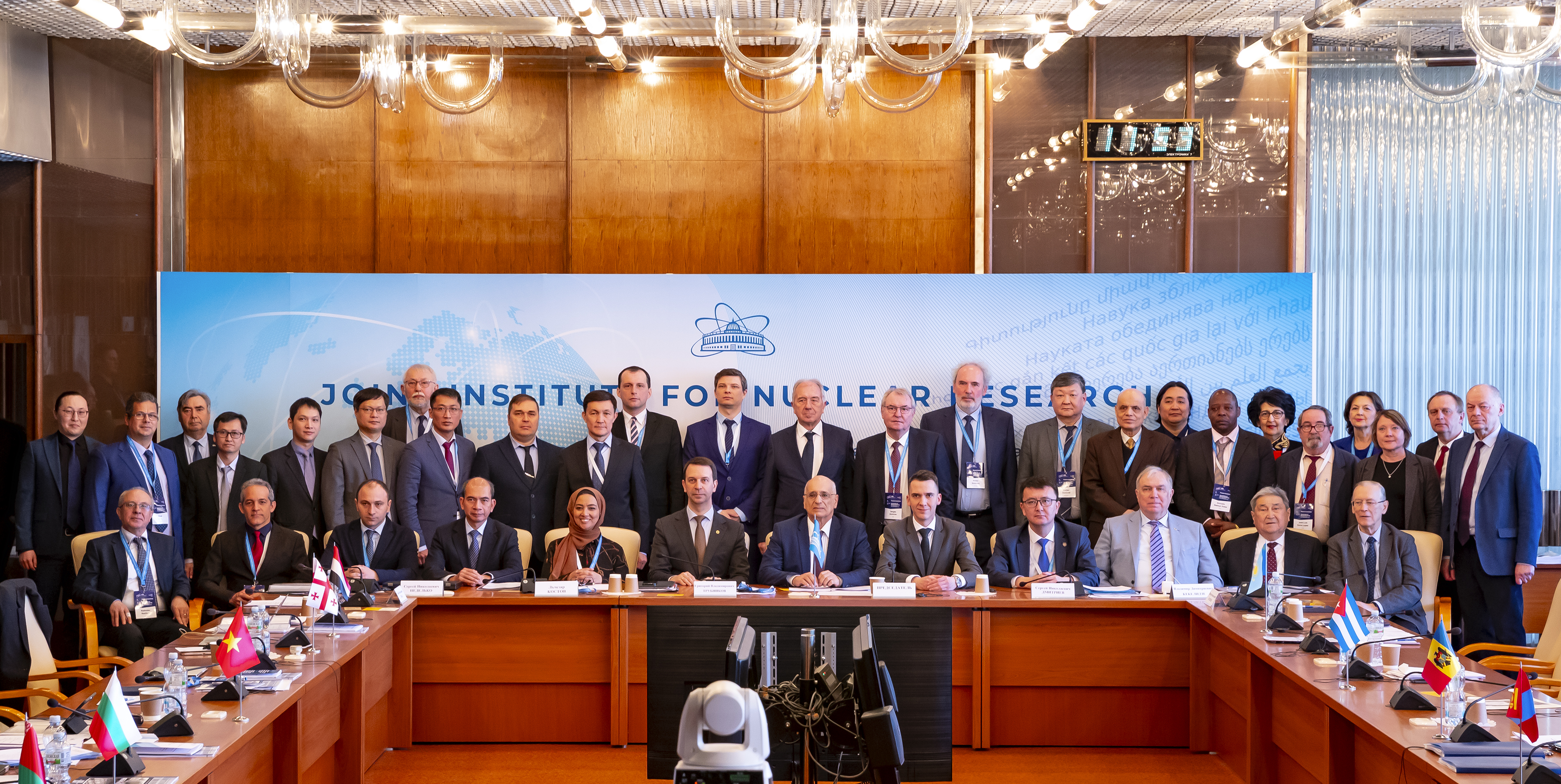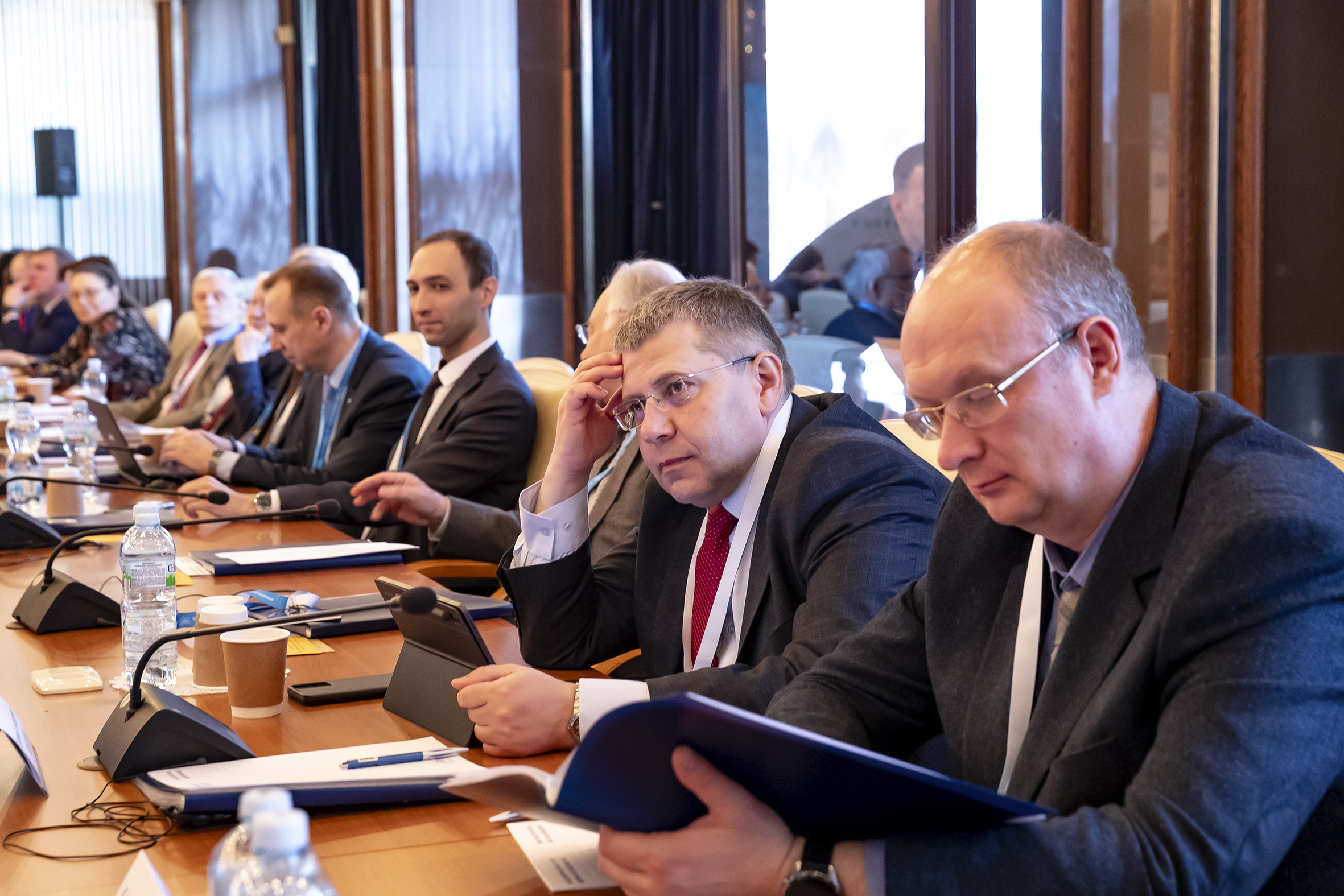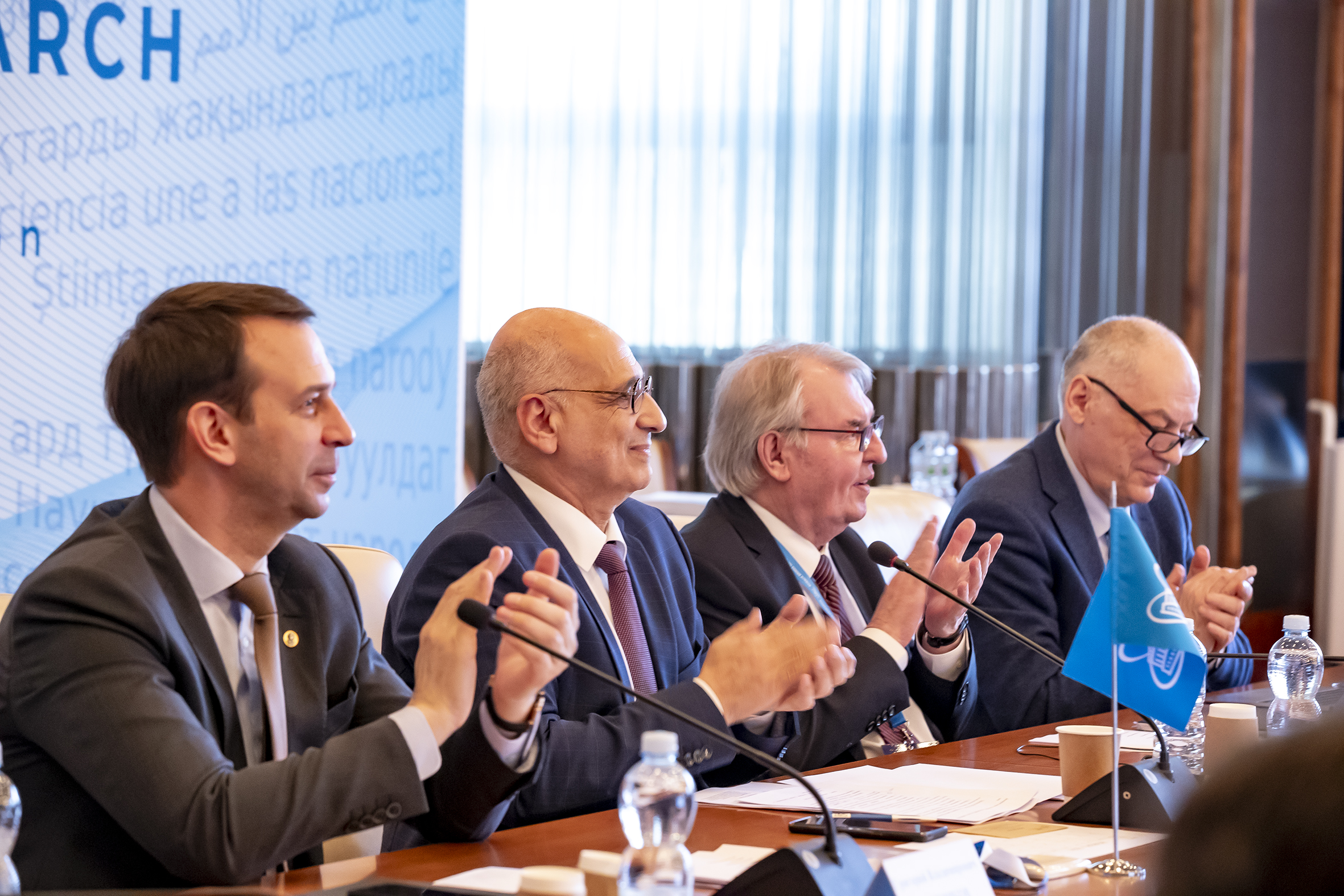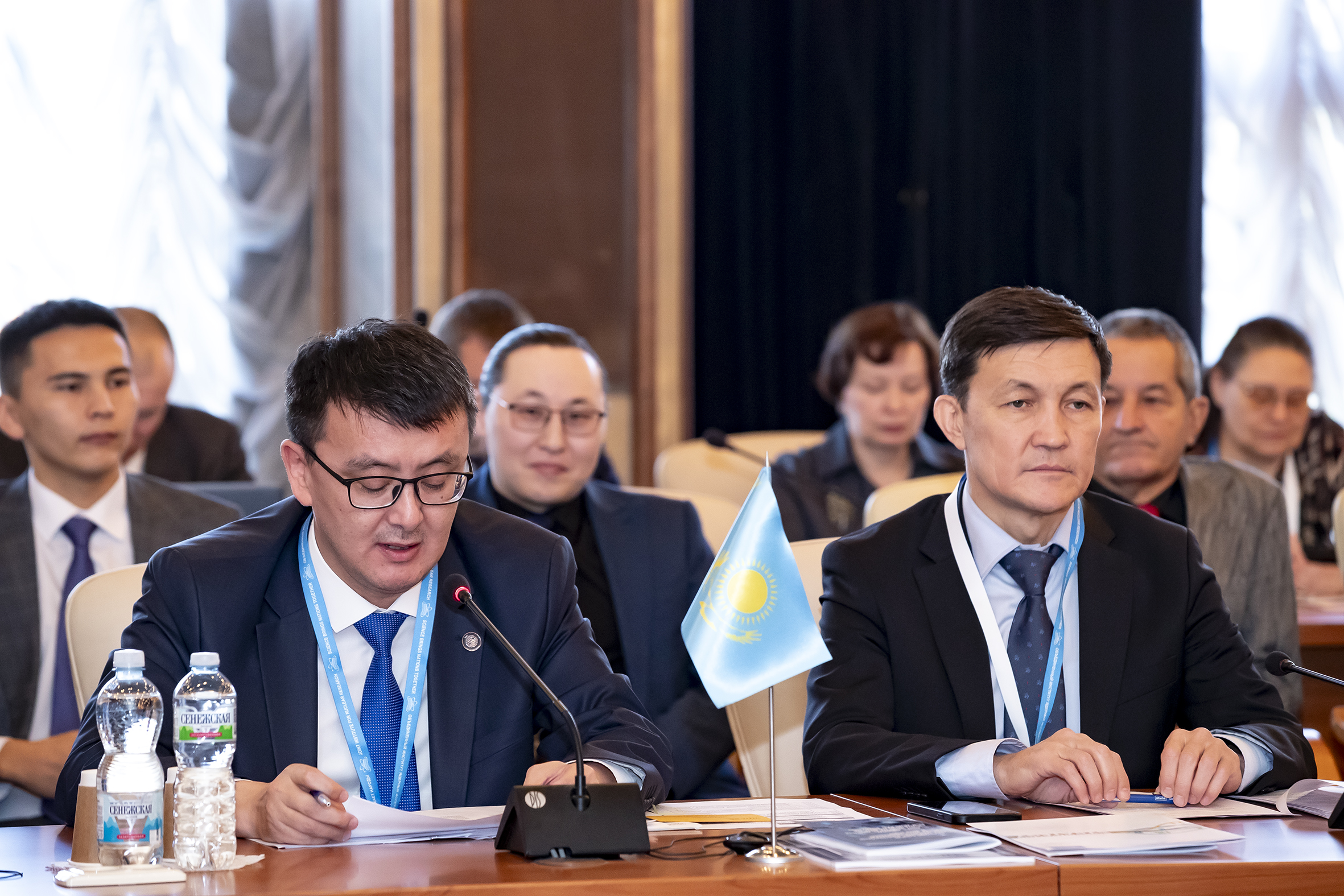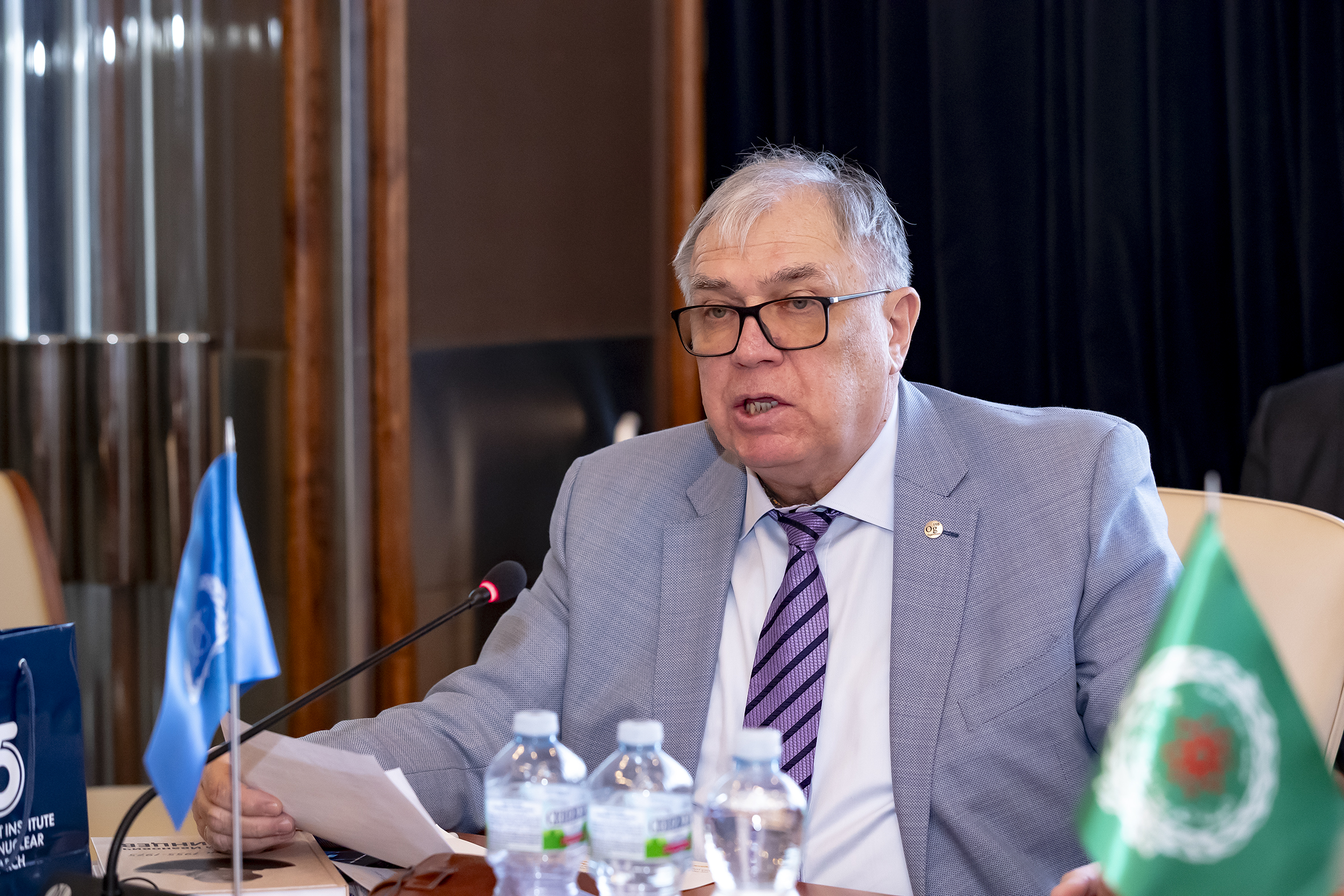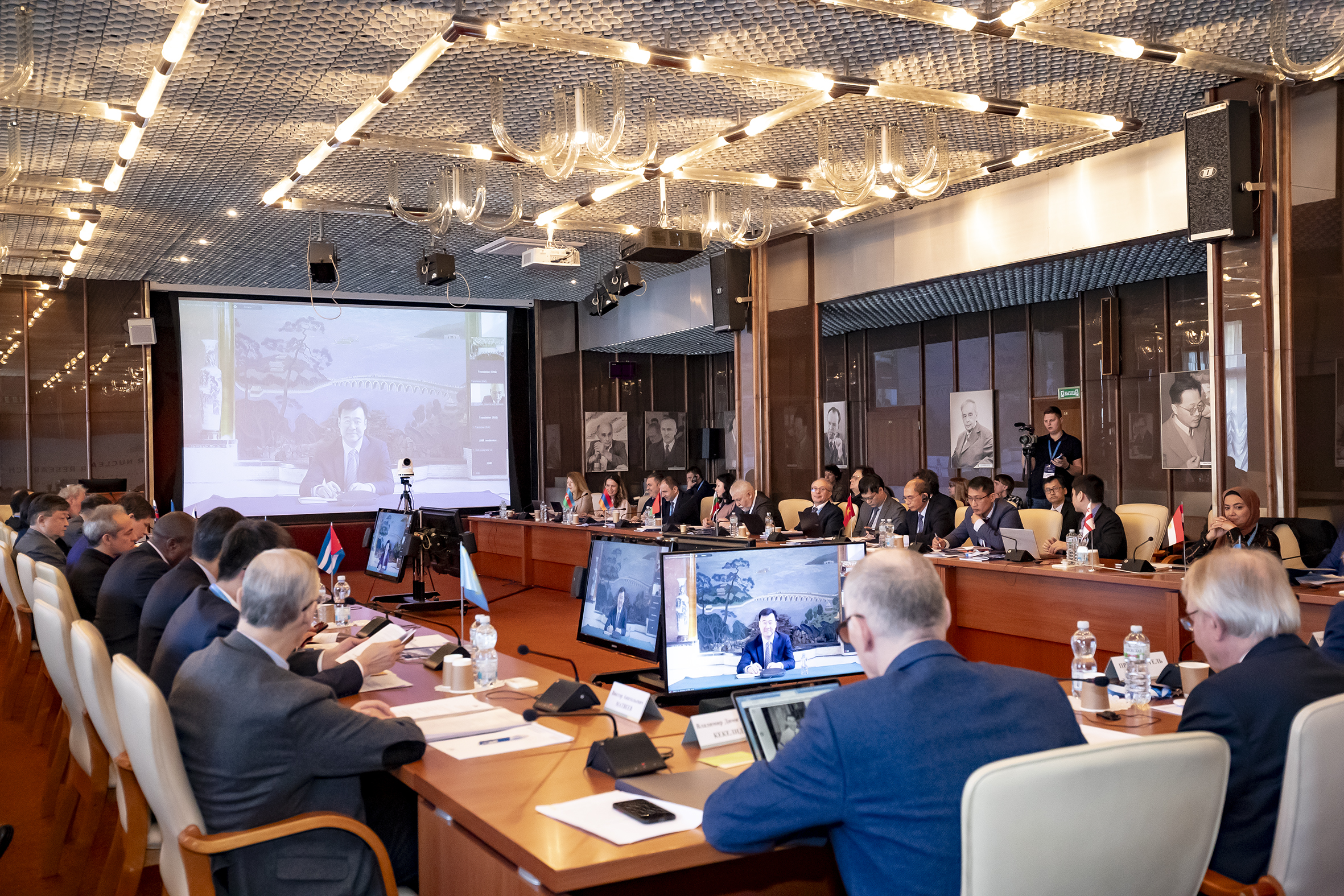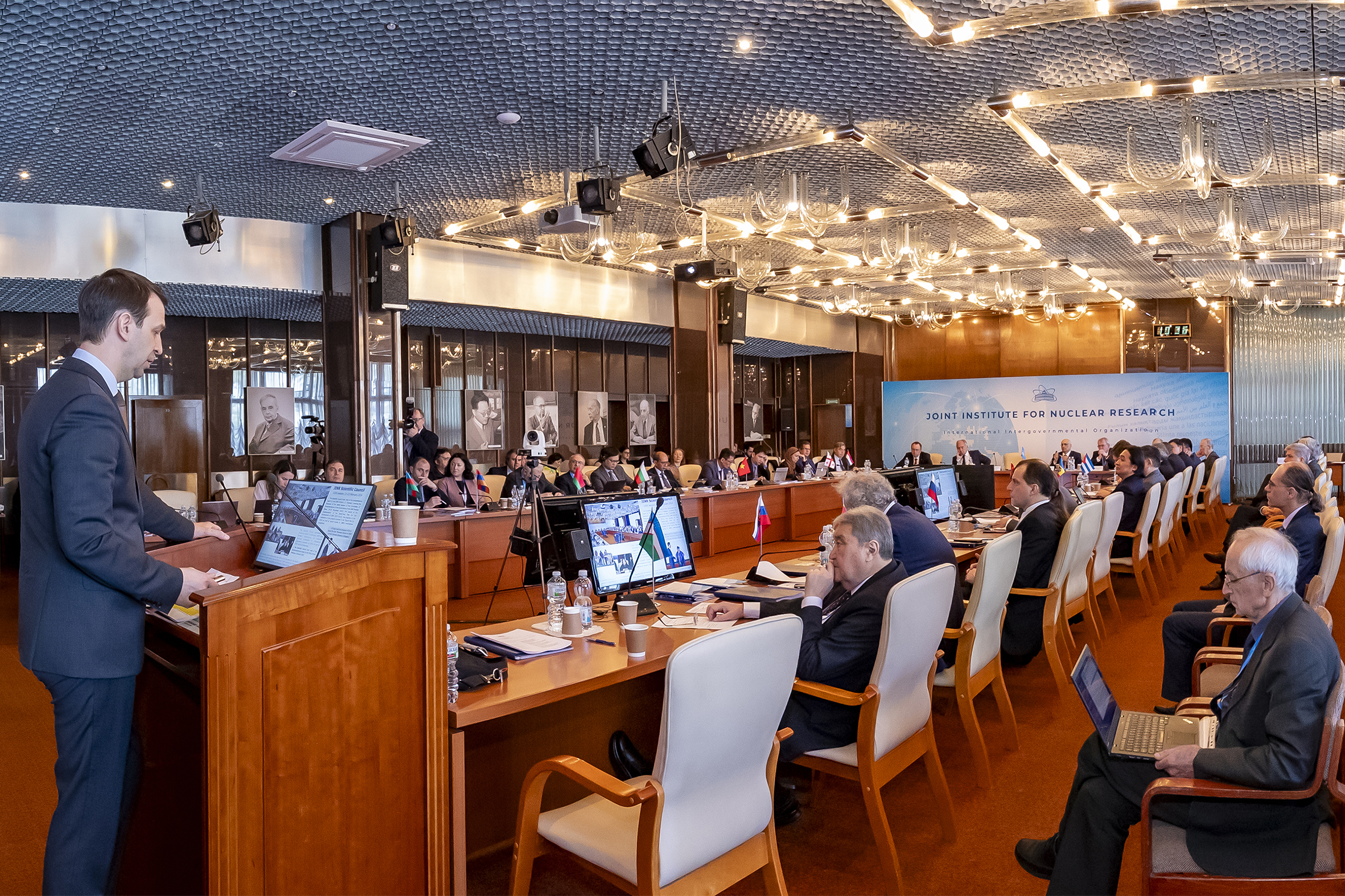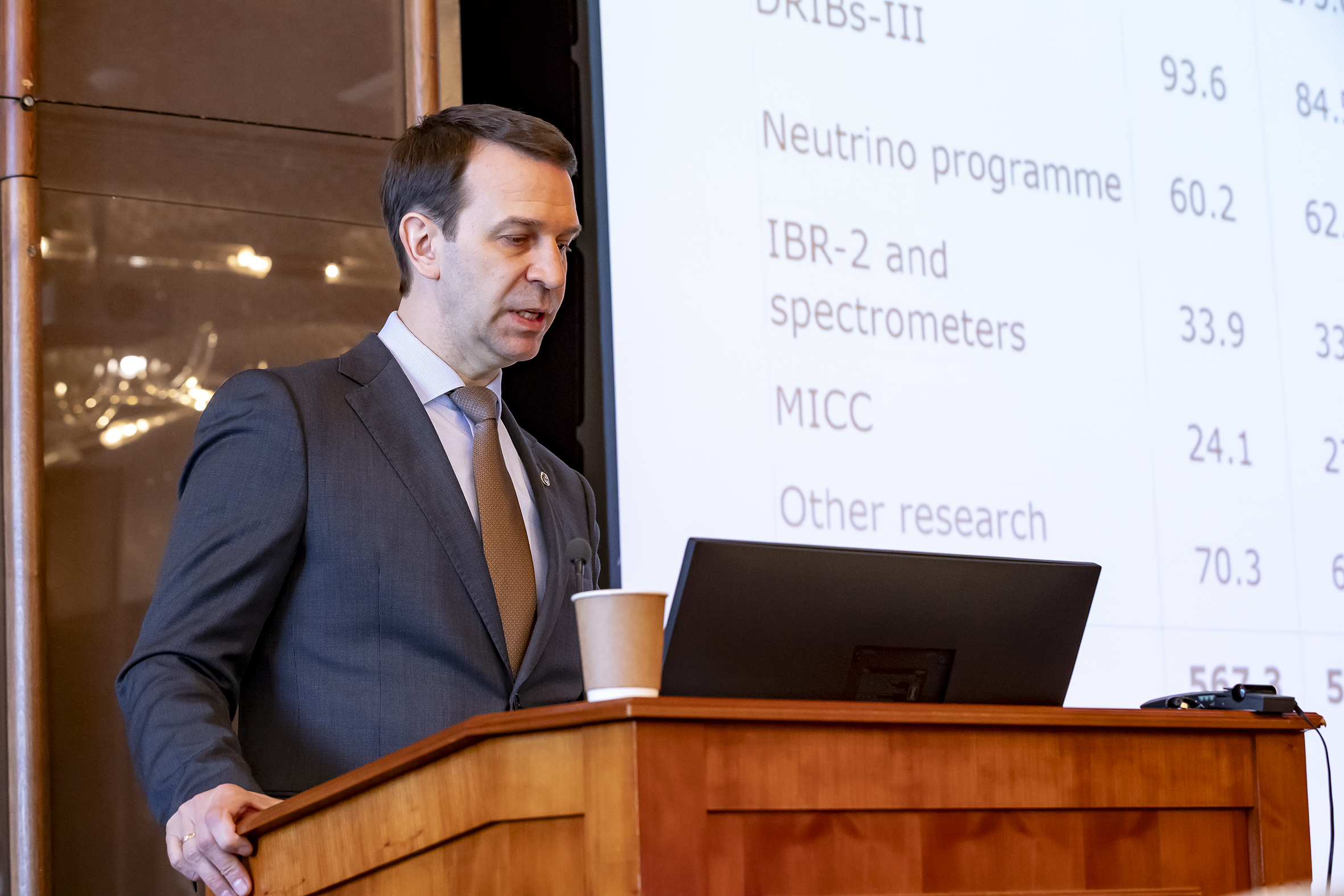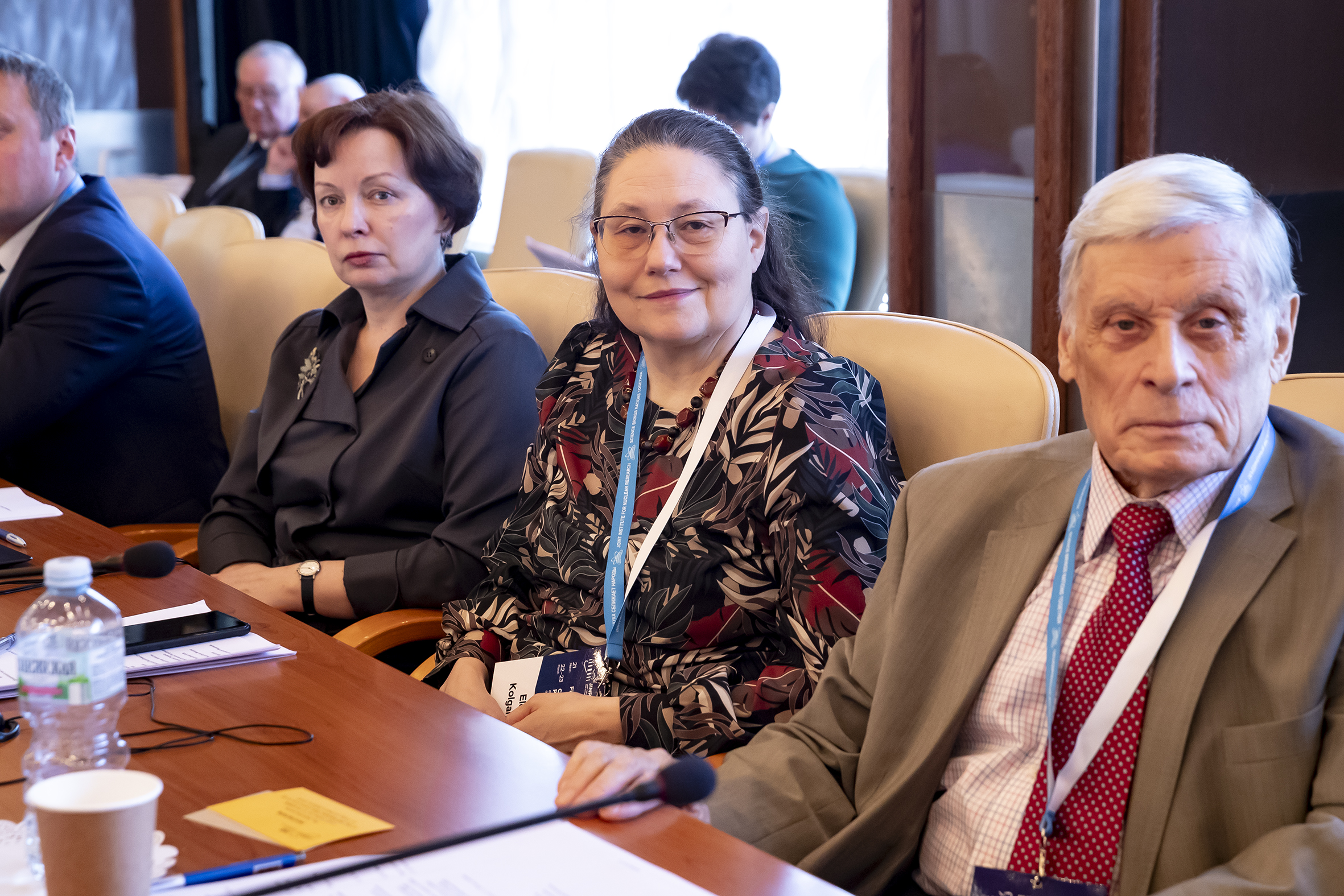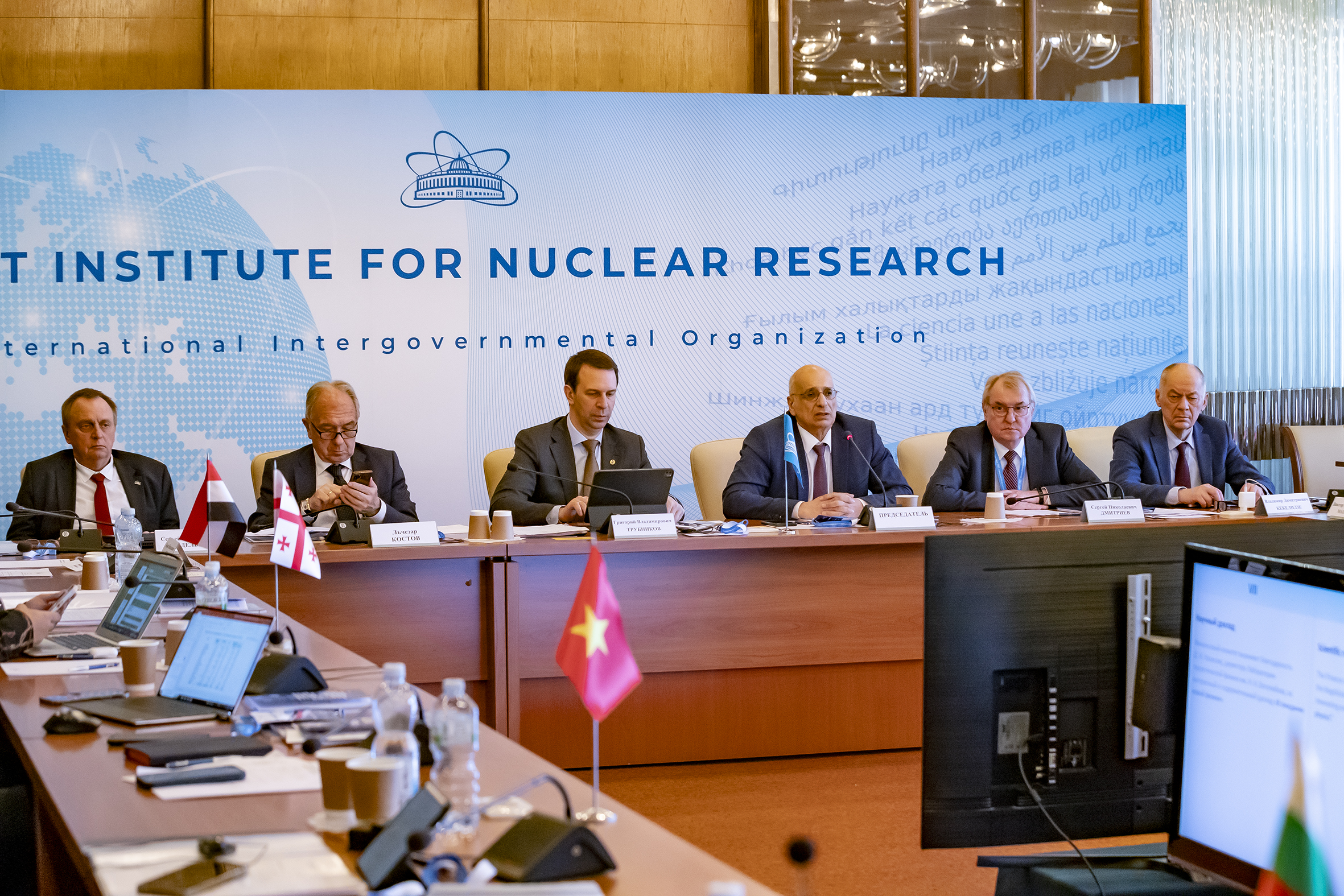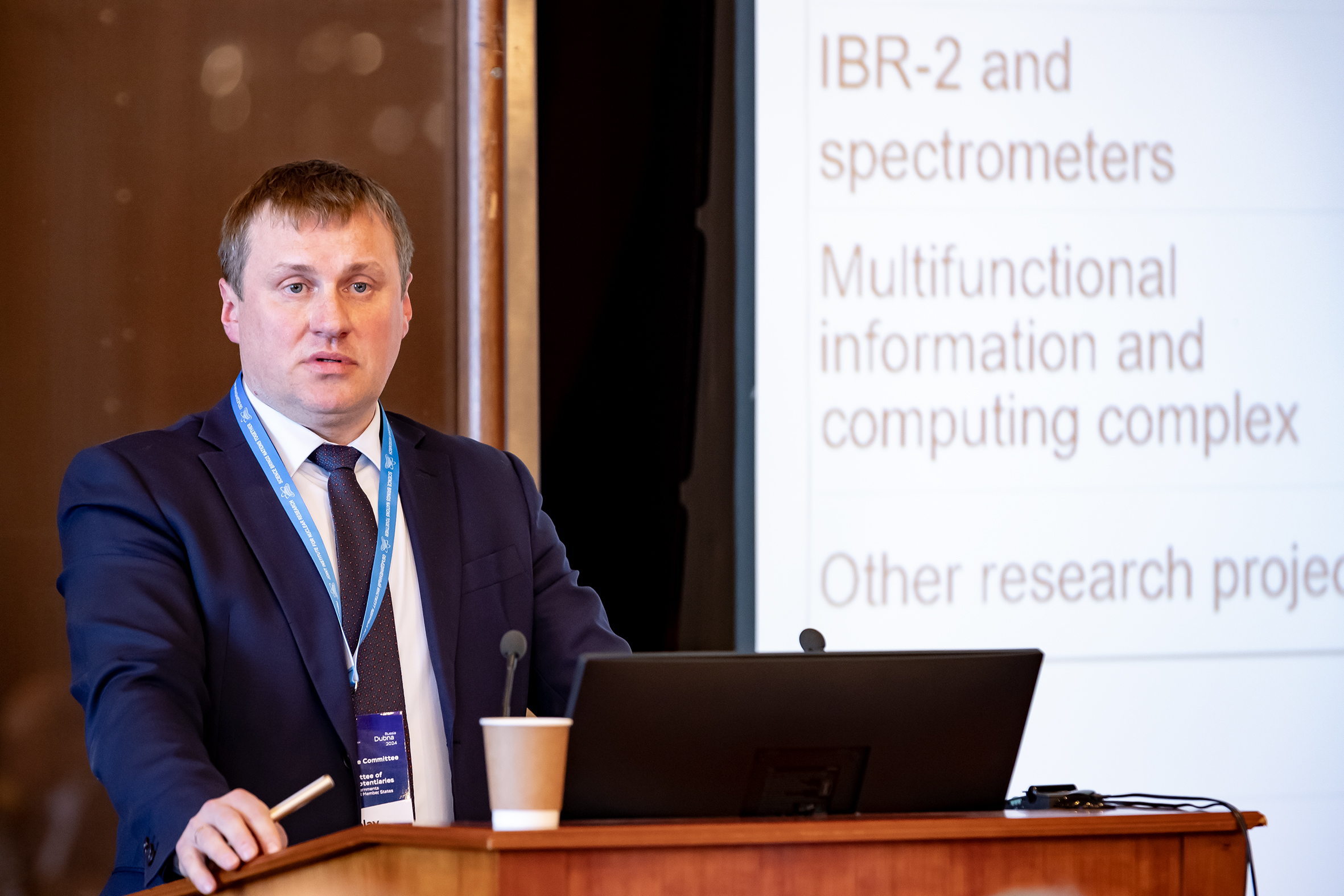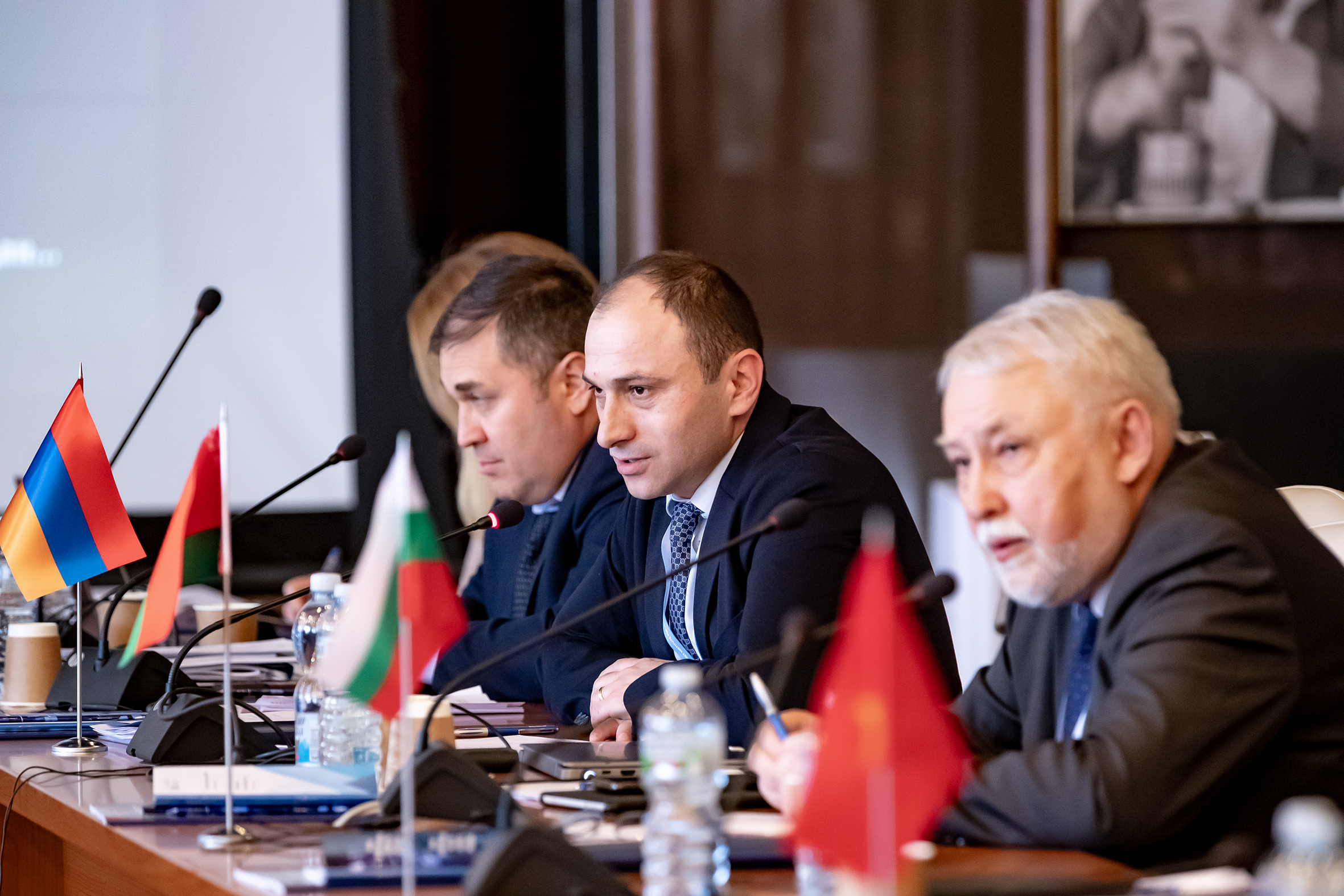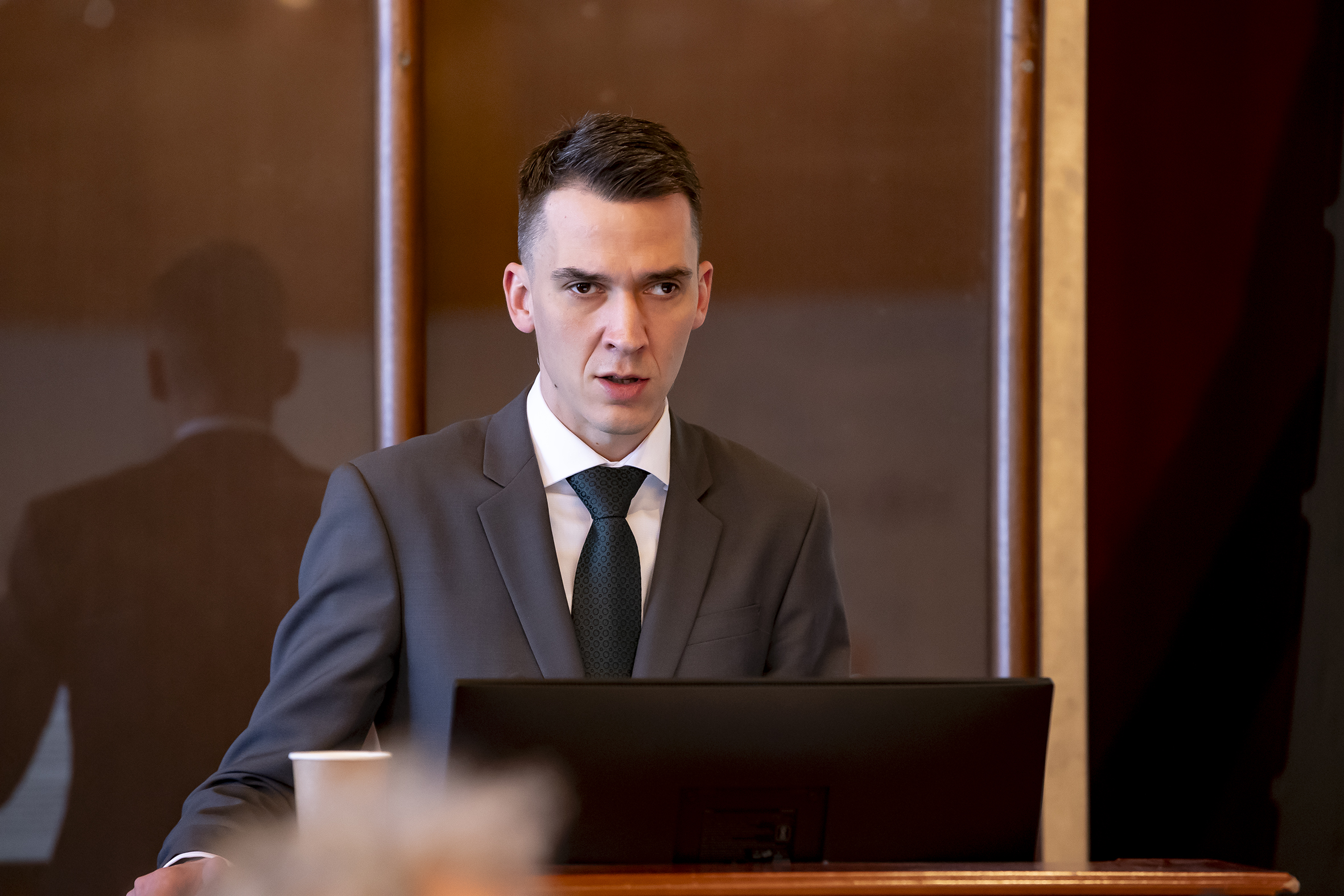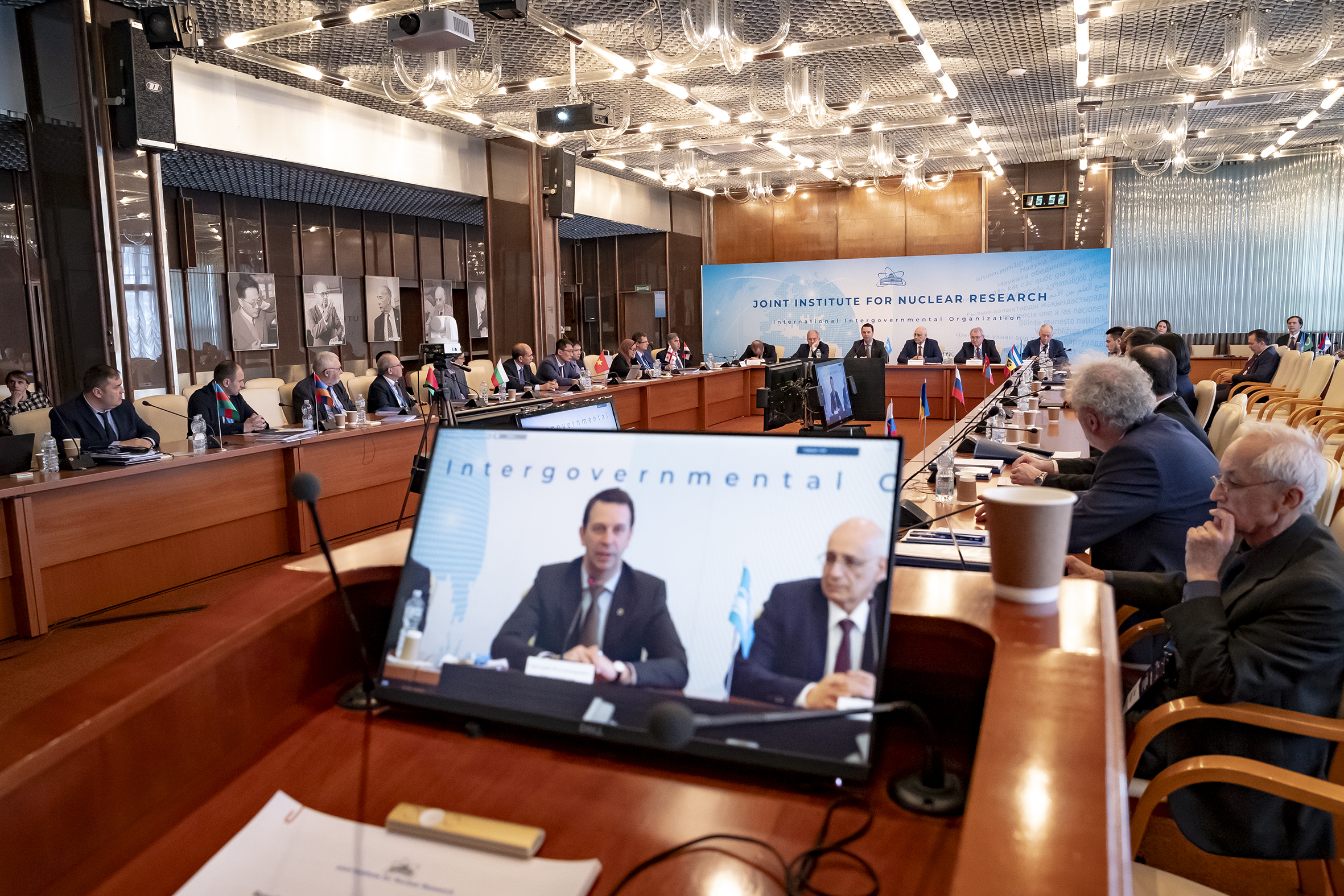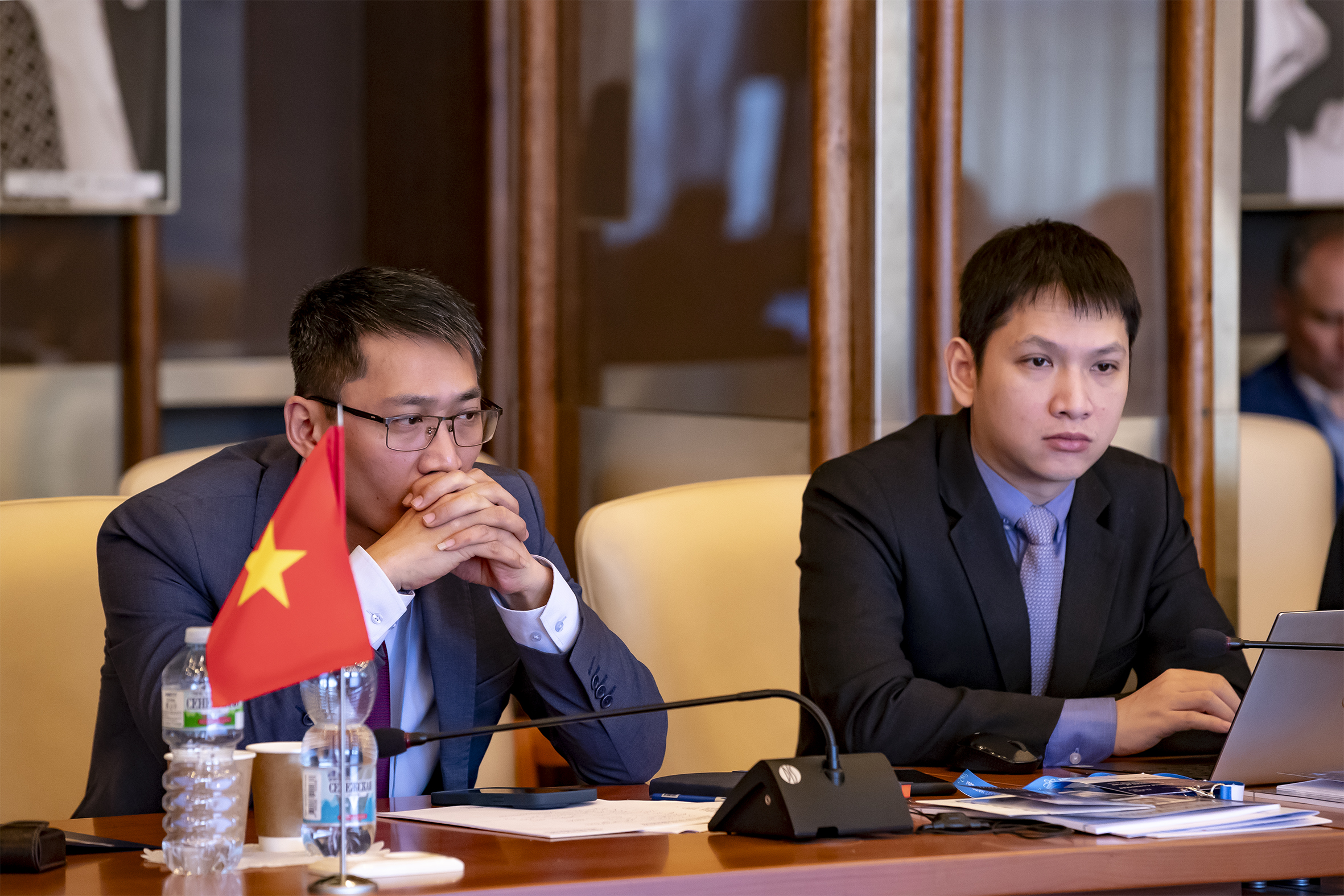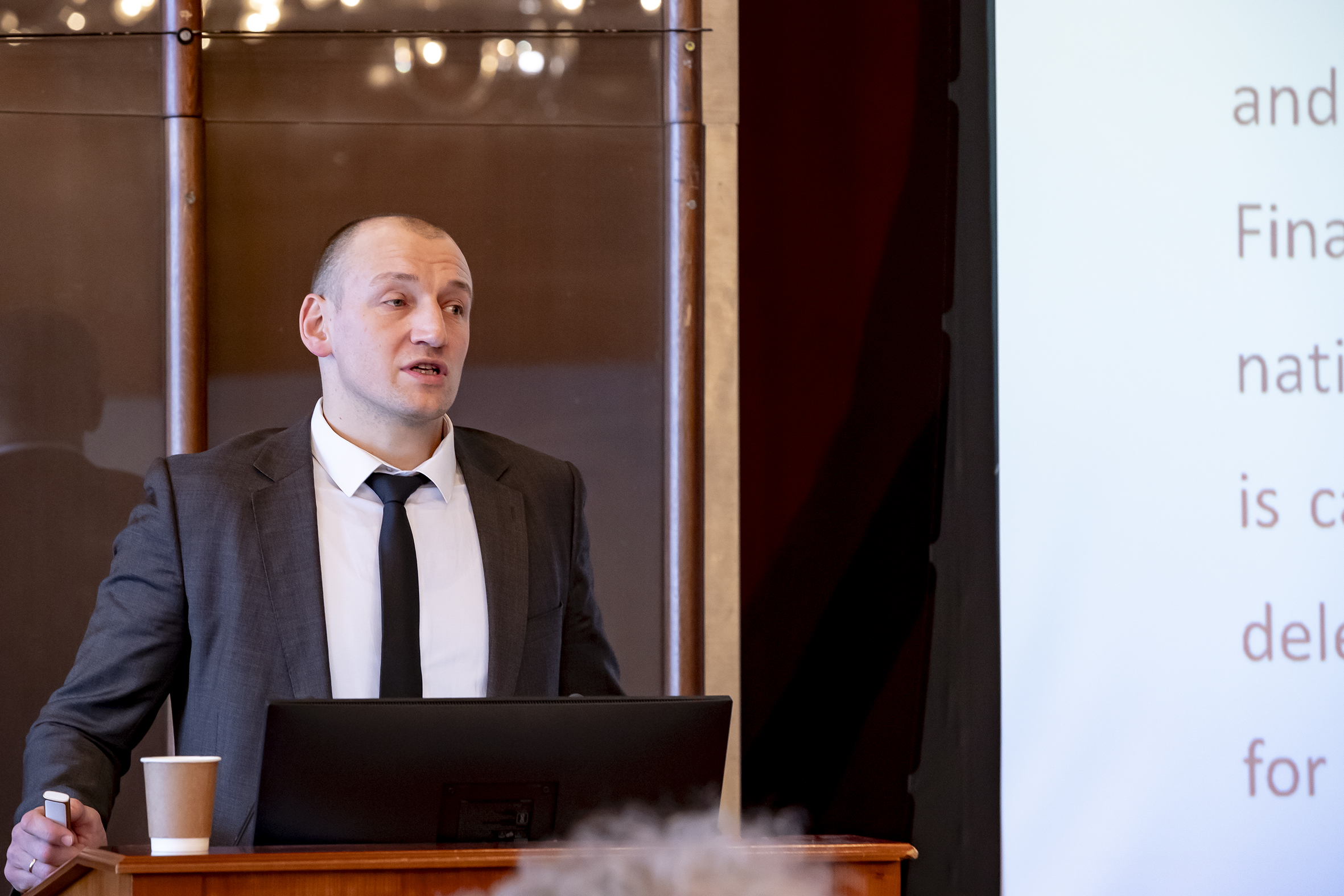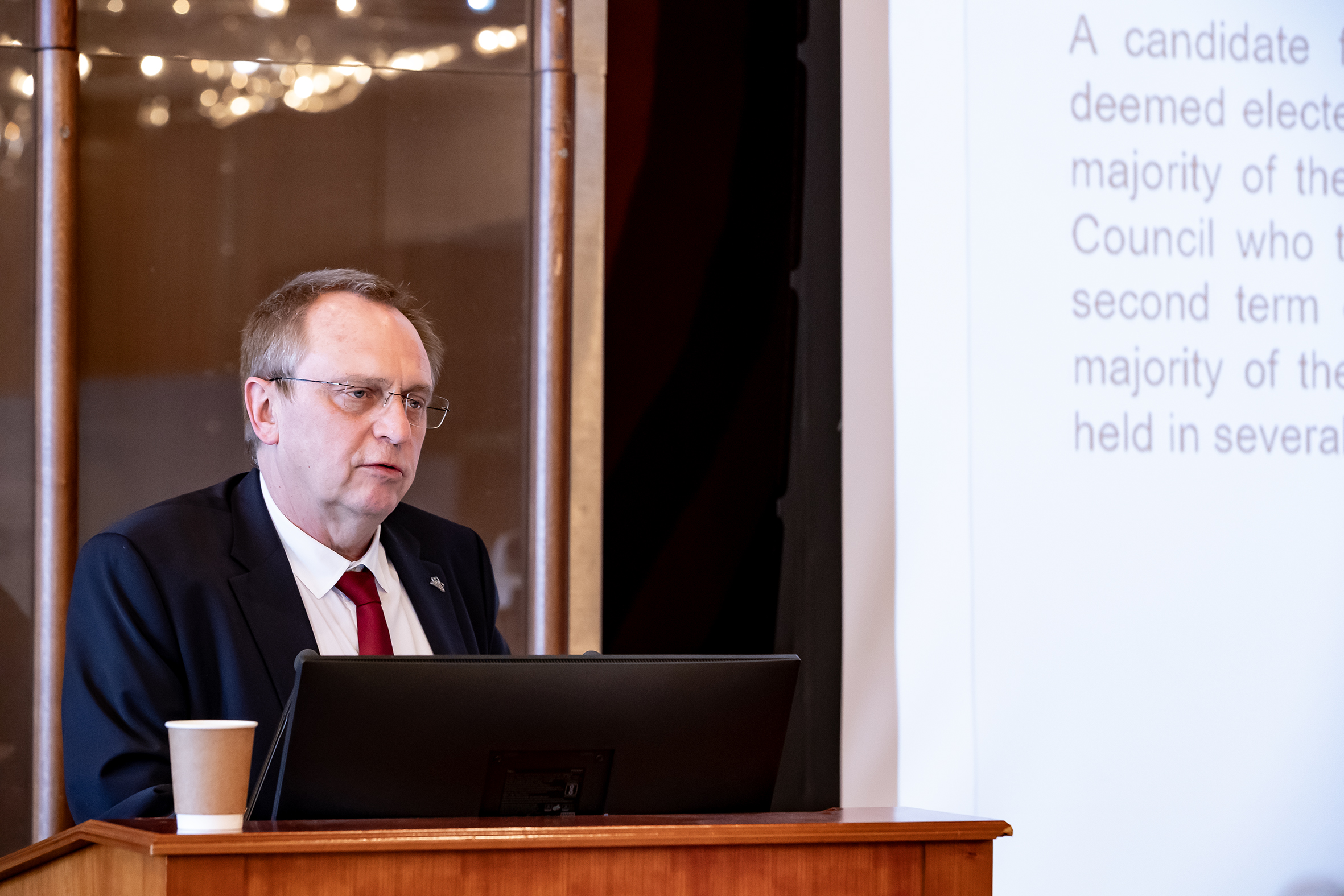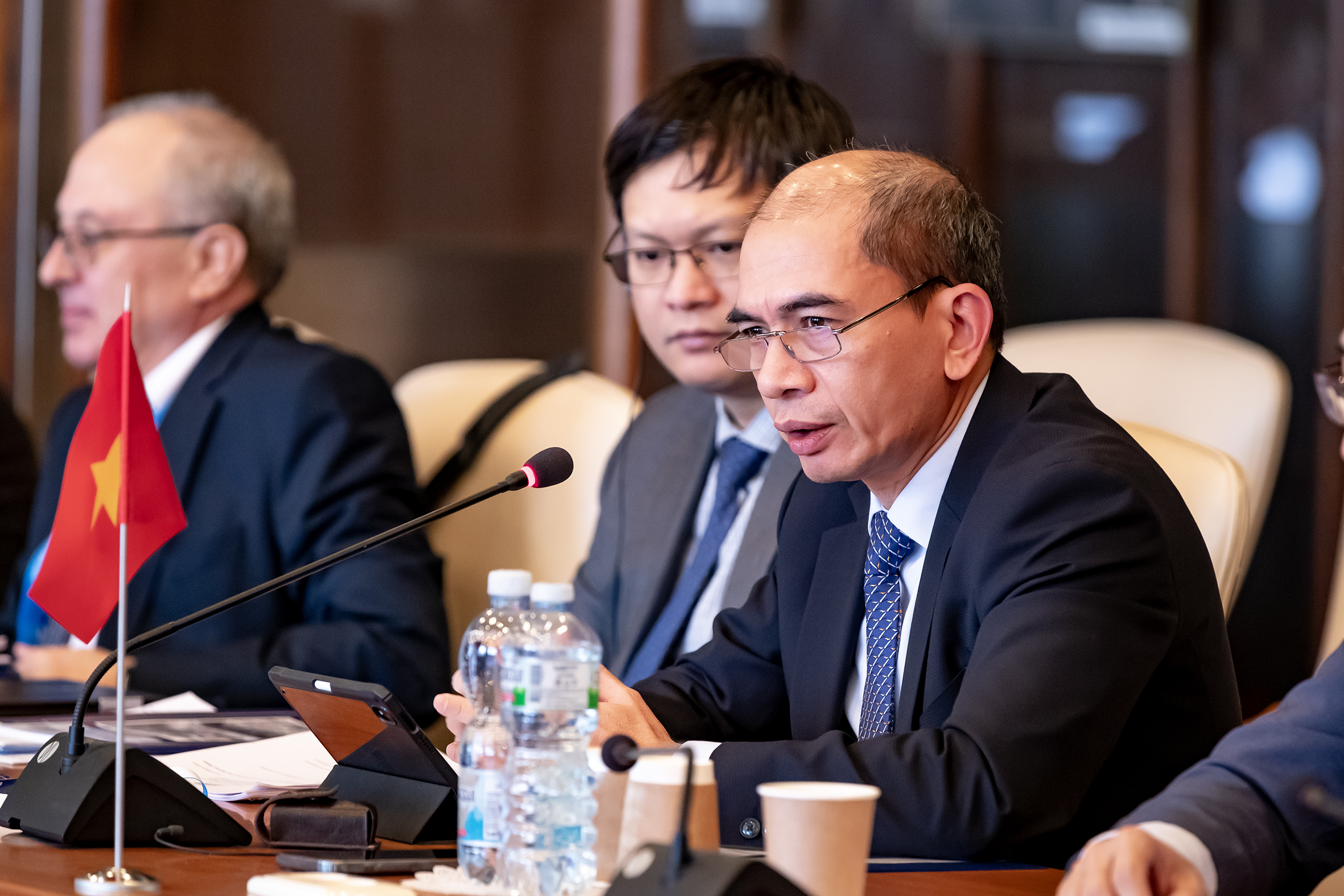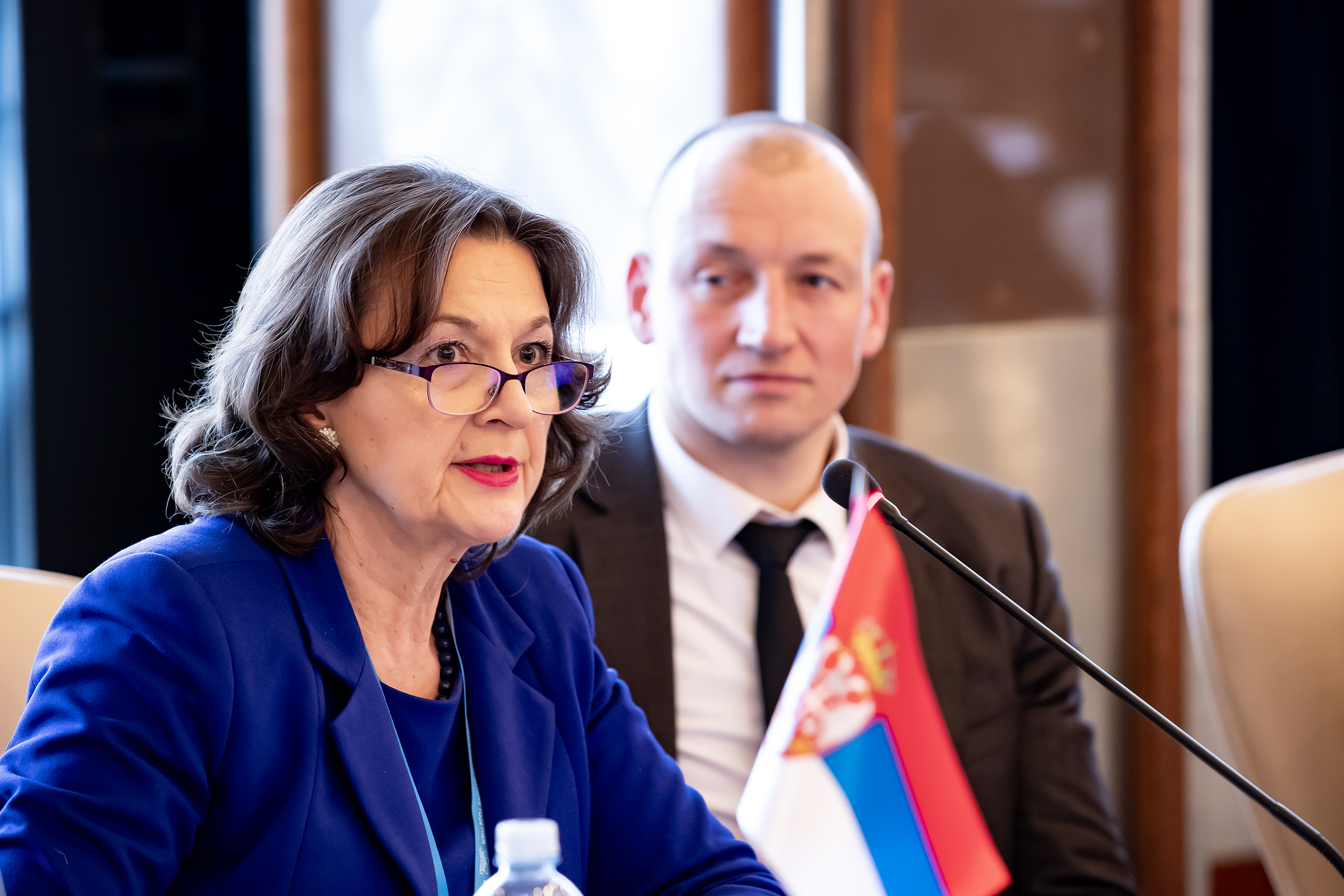First CP JINR meeting in new seven-year period
News, 26 March 2024
A session of the Committee of Plenipotentiaries of the Governments of the JINR Member States (CP JINR) took place on 22 March chaired by Plenipotentiary Representative of the Government of Georgia Arsen Khvedelidze. The CP members got acquainted with the main research results of the Institute, its activities in personnel training and social infrastructure development. Following the results of the meeting, the 2024 Institute’s budget was approved and changes in a number of JINR documents were presented. Academician Yuri Oganessian received the title of Corresponding Member of the Cuban Academy of Sciences.
Plenipotentiaries of all JINR Member States attended the CP JINR session in person. Representatives of the relevant ministries of Cuba and Kazakhstan, the IAEA and the Arab Atomic Energy Agency, the Dubna city administration, and Dubna State University took part in the meeting.
The session started with the announcement of Deputy Minister of Science, Technology and Environment of the Republic of Cuba Armando Rodríguez Batista about the awarding of the title of Corresponding Member of the Cuban Academy of Sciences to Scientific Leader of the Laboratory of Nuclear Reactions at JINR Yuri Oganessian.
Vice-Minister of Science and Higher Education of the Republic of Kazakhstan Darkhan Ahmed-Zaki noted, “JINR provides a unique opportunity for our researchers and students to improve their skills, gain knowledge and experience, and participate in international collaborations. Cooperation with JINR meets our priorities, including development of new technologies and innovations”.
Mikhail Chudakov, IAEA Deputy Director General, conveyed the greetings of Agency’s Director General Rafael Mariano Grossi to the CP members. He highlighted the current effective collaborative work and outlined plans for its expansion, and invited JINR to take part in a number of events organized by the Agency in 2024.
Minister-Counsellor for Science and Technology Affairs at the Chinese Embassy in Russia Zhou Yu congratulated the Joint Institute on the 68th anniversary of its foundation. “JINR is one of the best nuclear physics institutes occupying leading positions in the world. It is especially important for us to have a large number of researchers from China working here. Based on the long-term successful history of joint work, mutually beneficial cooperation between JINR and Chinese research institutes and universities continues to develop dynamically,” he admitted.
JINR Director, Academician Grigory Trubnikov presented a report on new R&D results and the most important events related to research and educational activities and JINR international cooperation. The results of the past seven-year period were highly appreciated at the 135th meeting of the JINR Scientific Council in February this year.
The complex of buildings and facilities of the first NICA stage is 99% complete. Grigory Trubnikov announced the signing of a cession agreement in early March. According to the document, the rights of the general construction contractor will be transferred from the Austrian STRABAG to the Russian TES LLC. The new general contractor has considerable experience in working with nuclear energy facilities and building units for nuclear power plants. The construction of the NICA Innovation Centre will begin in June. The cryogenic compressor station will be put into operation this summer. The production and cryogenic testing of the collider magnetic system components have been completed, the power supply systems of its elements are ready for operation. The next commissioning of the NICA Complex is planned for the end of the year.
Grigory Trubnikov especially noted the support provided by the Ministry of Science and Higher Education of Russia to research teams participating in megascience projects. The JINR Director expressed great gratitude to the key partners in the NICA Project from the JINR Member States and the People’s Republic of China for their assistance in creating the NICA Collider subsystems.
Grigory Trubnikov underlined that the main task of the MPD Collaboration at NICA is to put the superconducting solenoid of the facility into operation. At present, cryogenic testing of the solenoid has begun, and the temperature of -50 °C has been reached. Cooling of the solenoid to the temperature of 4.5 K is planned for September. In the BM@N Experiment, statistically significant signals of Λ and Ξ hyperons and the K0s meson have been obtained for further physics analysis. The ARIADNA Collaboration for applied research is developing. In addition to SOChI, two more stations, SIMBA and ISCRA, have been put into operation.
Over the past year, more than a hundred JINR employees continued to actively participate in the CERN experiments. The Institute’s successful participation in the CERN collaborations with the fulfillment of all obligations was highlighted. The high level of JINR’s work as part of the second modernisation stage of the ATLAS, CMS and ALICE Detectors at the LHC was mentioned as well.
The 2024 expedition to Lake Baikal to build the Baikal-GVD Neutrino Telescope successfully continues. According to its results, the total number of installed modules will reach 4000. JINR is an active participant in the implementation of two large neutrino experiments: RICOCHET (ILL, France) and JUNO (China).
A series of unique experiments is carried out at the Superheavy Element Factory. In the 54Cr+238U reaction, two events were observed with the new isotope 288Lv, which is an important step in preparation for the synthesis of the new element 120 in the 54Cr+248Cm reaction. The U-400M Cyclotron is being upgraded, the DC-140 Accelerator is under construction, the U-400R Accelerator hall is being built. “After the U400-M is put into operation, the beam intensity will increase, which will significantly expand the capabilities of the experimental programme for studying light exotic nuclei,” Grigory Trubnikov noted.
Fundamental and applied research areas related to life sciences and condensed matter physics are actively developing due to the establishment of an interlaboratory scientific programme, in particular, at the Laboratory of Radiation Biology.
At the Laboratory of Theoretical Physics, important results have been obtained in theoretical elementary particle physics, physics of atomic nuclei, condensed matter physics and modern mathematical physics, particularly aimed at supporting the JINR Experimental Programme.
Preparations for the launch after maintenance of the IBR-2 Reactor, which celebrated 40 years since its commissioning this year, are being completed. The spectrometer complex is being upgraded: a wide-aperture backscattering detector (BSD-A) for a high-resolution Fourier diffractometer, a small-angle neutron scattering detector (SANSARA), and an inelastic neutron scattering spectrometer in inverse geometry (BJN) are being created.
The JINR Multifunctional Information and Computing Complex is successfully progressing. The capacity of the Govorun Supercomputer, the fastest supercomputer in the Member States, has been increased. The DIRAC Platform has been significantly reoriented to support NICA and Baikal-GVD Megascience Projects.
Over the past year, 31 dissertations were defended at JINR: 26 candidate’s and five doctoral. JINR maintains high publication activity with about 1400 publications per year. Intensive work is carried out to create a new JINR scientific journal.
In terms of the number of students and young researchers who are involved in training programmes at the Institute, JINR has recovered from the effect of the Covid period. The branch of Moscow State University in Dubna began enrolling students in two master’s departments. It is planned to open two more departments: Radiochemistry and Radiobiology and Computer Science.
Significant events took place in international scientific and technical cooperation. In February, a JINR scientific school was held in Cuba. An agreement on expanding partnership was signed with Yerevan Physics Institute (Alikhanyan National Science Laboratory). Ties with the JINR Associate Members are strengthening. At the end of last year, the 9th meeting of the JINR–Serbia Joint Coordination Committee was organized. In January, the JINR Director met with the Head of iThemba LABS, the largest research organization in nuclear physics in South Africa. Cooperation continues to deepen with the new partner countries. Last year, a meeting of the JINR–Mexico Joint Coordination Committee took place, at which four collaborative projects were proposed for implementation. A large delegation with representatives of the relevant Brazilian ministry visited Dubna to discuss cooperation prospects. The Ambassador of Argentina to Russia visited JINR. In December, the JINR Information Centre opened in Tunisia. The second meeting of the JINR–China Expert Working Group was organized recently.
Grigory Trubnikov reported on the Joint Institute’s support for the IAEA Lise Meitner programme, which provides internships for women working in the nuclear industry. The Institute is increasing its participation in the International Decade of Basic Sciences for Sustainable Development (IDBSSD) under the auspices of UNESCO and is joining the Earth Charter.
The JINR Director emphasised that on the Institute’s initiative it is planned to create an international innovation park of science and technology in Dubna, including, in particular, the construction of a modern university campus. The project is aimed at the comprehensive improvement of adjacent territories and will be implemented jointly with high-tech partners from the JINR Member States and partner countries, Dubna Special Economic Zone, regional and federal executive authorities, and Dubna State University.
The Institute expects a significant increase in the number of researchers from Vietnam, Egypt, and Mongolia. In order to implement the JINR human resource capacity building programme, the number of JINR corporate housing will be increased by several dozen apartments. The plans include the construction of a residential building of the JINR Resort Hotel in Ratmino and the reconstruction of two more buildings. Repairs are underway at the Dubna Hotel and the JINR International Conference Centre.
Head of the JINR Budget and Economic Policy Department Nikolay Kalinin presented updated information on the draft JINR budget for 2024 and the execution of the 2023 JINR budget. “The main areas of funds allocation are the support and implementation of our research projects, the improvement of engineering and technical infrastructure,” the speaker commented. The financial support programme for retiring employees has been launched. The CP approved the execution of the 2023 budget and the revised JINR budget for 2024.
Chairman of the JINR Finance Committee, Deputy Minister of Science and Higher Education of Russia Andrey Omelchuk spoke about the results of the Finance Committee meeting on 21 March. The Working Group under the CP Chair for JINR Financial Issues will work out an approach for determining the annual contributions of the Member States, taking into account the annual increase in the JINR budget by 5% during 2024–2030, and will submit it for consideration at the next meetings of the Finance Committee and the Committee of Plenipotentiaries. The Korsakov and Partners became an external auditor of JINR’s financial activities again.
“The Ministry of Science and Higher Education of Russia positively evaluates JINR’s participation in the international scientific agenda and deepening cooperation with other countries. The number of the Institute’s partners is increasing today, active work is underway with various international organizations. This is quite a positive sign, since the number of collaborating countries is growing and representation of the Institute around the world is increasing. Ties are strengthening with Latin America, the Middle East, and North Africa. Enhancement of the Institute’s cooperation with leading Russian organizations should also be noted. Together with Kurchatov Institute and the Institute of System Programming, JINR established a consortium to support megascience research infrastructures. The Institute will soon be able to provide the Member States with access to other large experiments and megascience facilities that are being built in Russia, including thanks to the Science and Universities National Project. For example, the SKIF Synchrotron, the PIK Reactor, and a brand new SILA Facility, which will be launched before 2033, and others. This link needs to be fostered, including through existing measures to popularise science and physics as a discipline in general among schoolchildren and students, in order to avoid issues of training highly qualified personnel and the influx of researchers into the field,” Deputy Minister of Science and Higher Education of Russia Andrey Omelchuk said.
The CP members approved the draft List of JINR Officials. After the session, it will be sent to each Plenipotentiary for agreement with the Governments of the JINR Member States. At the meeting, the Rules of the JINR Finance and Plenipotentiaries Committee were approved in new editions.
To mark the 40th anniversary of the IBR-2 Research Reactor, it was decided to name the area in front of the reactor at the DLNP technical site after one of its creators, Vladimir Ananyev. The Chief Engineer of the Laboratory of Neutron Physics was at the heart of both the Laboratory and the IBR-2 Reactor, going all the way from design to construction and launch of this unique facility. At the end of the meeting, Grigory Trubnikov addressed all JINR employees, “I would like to thank the entire team of the Institute, everyone involved in the bright achievements that were discussed today. I am proud of our employees,” the JINR Director concluded.
The next session of the Committee of Plenipotentiaries will take place on 15–16 November 2024. The meeting of the Finance Committee will be held the day before.
